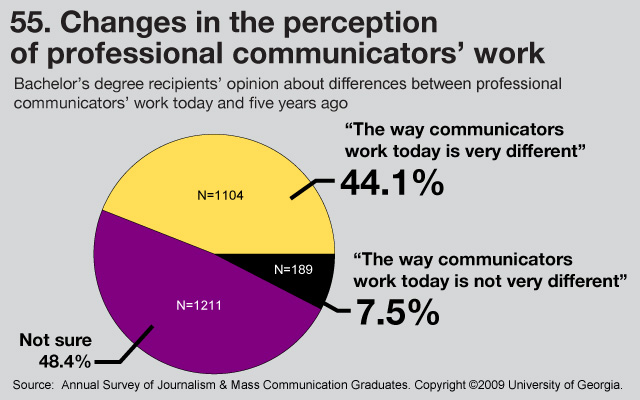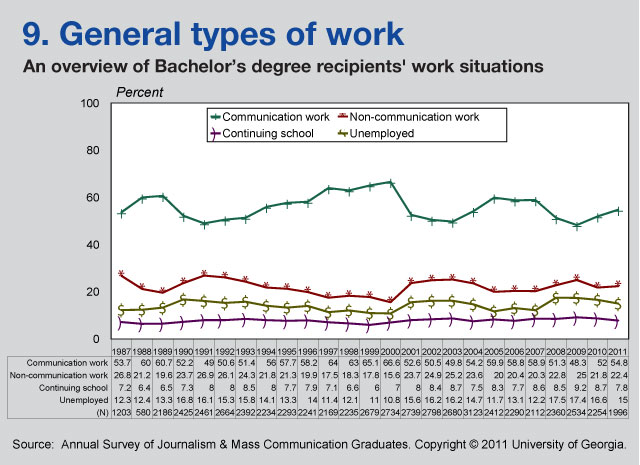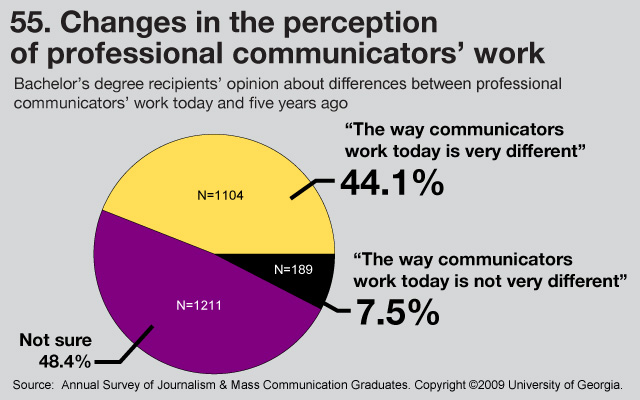
Asking the Wrong Questions in Journalism Education
By Amber Robertson
Would it be safe to assume that a survey of recent journalism and mass communication graduates would overflow with data of how they are seizing ever-growing new media opportunities? Apparently not.
The Annual Survey of Journalism & Mass Communication Graduates seems to ask the wrong questions year after year. The 2011 survey was released on Aug 9 during the AEJMC conference in Chicago. Designed to monitor employment rates and salaries of U.S. journalism and mass comm graduates, it leaves a lot of room for improvement.
The surveys are written under the direction of Dr. Lee Becker of the Cox Center at the University of Georgia. They’re sponsored by various journalism education associations. An opportunity to revamp the survey may come as a result of the ASJMC agreeing to take on a stronger role in it. The ASJMC, which represents deans and department heads, could spearhead change.
At its best, the survey would track issues that matter to journalism education reformers — and find out what the graduates really think of the education they just received and how schools could improve.
The current survey focuses on traditional media jobs, such as radio, television, PR and advertising. It fails to give enough attention to what it calls “other” – the digital media jobs, the ones that are booming. The result: charts like the one below with relatively straight lines, not showing much change over the decades.
After 30 years, the main thing the survey has done is proven what questions no longer need to be emphasized.
The lack of digital media-related questions is not because students are silent on the subject. In the open responses, graduates give advice to future students using words such as “social media”, “app development and publishing”, “HTML”, “tech journalism” and “web design.” They just aren’t asked to give advice to their professors.
A problem of how to define categories could be addressed. Many of the terms in the categories require clarification. For example, in Question 9, below, what constitutes communication work? Does communication work count even if it is at a non-communication-related company? It should.

Feedback from students would allow educators to see where gaps in their curricula exist and how they can make changes to correct them. When such larger questions have been put into the survey in the past, the results have been alarming. For example, below, from the 2009 survey, which measured changes in the perception of professional communicators’ work, only 44 percent of people believed the way communicators work today is very different than it was five years ago. This is startling: 5 years ago we were in the middle of the largest digital transformation in communication history (and still are). If only 44 percent of the journalism and mass comm students can answer the question correctly, journalism education gets an “F”.

If these do not sound like convincing arguments to change the survey, consider the return rate of the surveys has dwindled over time. The 2011 survey was mailed (on paper) three times before it was finally e-mailed to students. The response rates for paper mailings are 24.6 percent, even though online surveys would yield higher response rates and save money.
As a recent graduate, I’d like to offer a few sample questions: Did you feel that your degree was worth the amount you paid? How much debt did you graduate with? Did your university make an effort to show you what kinds of media jobs were available and realistic in a 2012 market? Do you feel your university should have offered more classes on digital media? After you graduated, did you resort to unpaid internships and graduate school although your first choice was to get a full time paid job? Looking back, would a 4-year apprenticeship instead of a 4-year degree have been more helpful for your job search? Could you have benefited from a “teaching hospital” model of education?
My colleagues think we should ask even more, things like: Do classes like ethics, law and history have digital components? On a scale of 1-10, with 10 being totally digitally up to date, where do you rank your school? Would you have taken more classes in your major if allowed? Does your j/comm school actively partner with computer science or business departments? Do students in j/comm write computer code? Do they create new companies or invent new technologies? Do they apply the latest (within weeks or months) technologies to journalism? Do you get grounding in all media as part of your major? Do you learn how to work collaboratively in small groups with students from other majors, such as engineering and business? Do your student media work focus not just on informing but also on engaging communities? Did anyone teach or even talk about the science of engagement and impact?
These are the things graduates would like to report and reformers want to know.
Amber Robertson is a special projects contractor at Knight Foundation.
Recent Content
-
Journalismarticle ·
-
Journalismarticle ·
-
Journalismarticle ·


